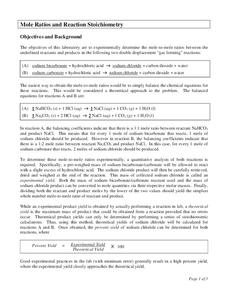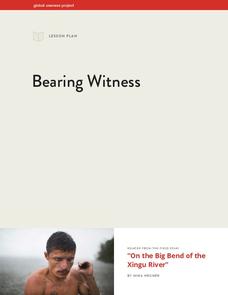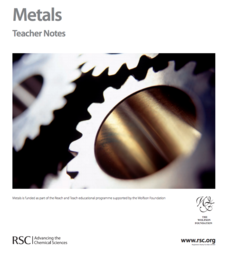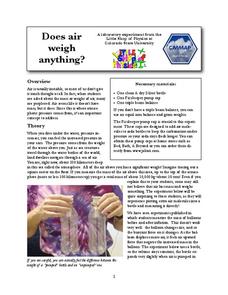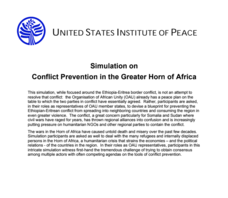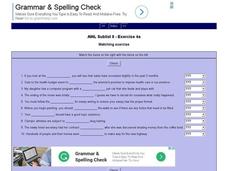Teach Engineering
Above-Ground Storage Tanks in the Houston Ship Channel
Introduce your class to storage tank failures caused by major storms with an activity that looks at how the concepts of Archimedes' Principle and Pascal's Law affect the storage tanks along the Houston Ship Channel. The background...
Teach Engineering
Preconditioning Balloons: Viscoelastic Biomedical Experiments
What does stretching a balloon have to do with equilibrium? Groups explore preconditioning by stretching a balloon to a point of equilibrium. They then measure the amount of force required to stretch the balloon to the same point several...
Teach Engineering
Forms of Linear Equations
Linear equations are all about form. The fifth part in a unit of nine works with the different equivalent forms of linear equations. Class members become familiar with each form by identifying key aspects, graphing, and converting...
Teach Engineering
Matching the Motion
It is not always easy to walk the straight and narrow. In the sixth portion of a nine-part unit, groups actively recreate a graph depicting motion. Individuals walk toward or away from a motion detector while trying to match a given...
Polar Trec
What Can We Learn from Sediments?
Varve: a deposit of cyclical sediments that help scientists determine historical climates. Individuals analyze the topography of a region and then study varve datasets from the same area. Using this information, they determine the...
University of Colorado
Astro-Chronology
Class members play a version of the game Chronology to determine when certain scientific events occurred in history. Teams play until someone has 5-10 events in the correct order.
Federal Reserve Bank
Lesson 3: A Fresh Start
The members of your economics class may be busy earning graduation credits, but the credit they should be concerned about is their financial credit. The third lesson plan in a unit about Hurricane Katrina and other events that can result...
Federal Reserve Bank
Lesson 4: Back to School
Based on your current level of human capital, how long would it take you to earn $1,000,000? What about your potential human capital? Learners explore the importance of education and experience when entering the workforce, and compare...
Santa Monica College
Mole Ratios and Reaction Stoichiometry
Stoichiometry sounds complicated, but it really means the study of the amount of substances involved in a reaction. The sixth instructional activity in an 11-part series has scholars use stoichiometry to find the theoretical yield of a...
Global Oneness Project
Bearing Witness
A controversial construction project in South America, the Belo Monte dam, is endangering local cultures, ecosystems, and communities. High schoolers create a concept map based on an online article they read before engaging in...
Global Oneness Project
Highways and Change
What is the cost of change? Roberto Guerra's photo essay "La Carretera: Life and Change Along Peru's Interoceanic Highway" asks viewers to consider the impacts of the 1,600 mile-long highway through Peru and Brazil that connects Pacific...
Bowels Physics
Torque: Rotational Statics and Rotational Dynamics
Scholars examine the application of torque in relation to motion by viewing a comprehensive presentation that explains the basic concepts related to torque and rotational motion. The lesson ends with examples showing how to calculate...
K5 Learning
Why Does the Ocean have Waves?
Six short answer questions challenge scholars to show what they know after reading an informational text that examines waves—what they are, what causes them, and how different Earth factors affect their size and strength.
Columbus City Schools
Planet X
How did the earth become the mass that it is now? Your young scientists explore this question through the concept of density. Their inquiries consider the impact of gravity on the formation of planets. The culminating activity of the...
NOAA
Journey to the Unknown
What's it like to be a deep-sea explorer? Tap into the imaginations of your fifth and sixth graders with a vivid lesson, the second part of a six-part adventure. Learners close their eyes and submerge themselves in an expedition aboard...
Beyond Benign
Packed Up Properties
Determine physical properties of potential packaging materials. Continuing from previous lessons in the series, the resource asks groups to identify physical properties of the substances. They test for conductivity, solubility, water...
Royal Society of Chemistry
Metals—Gifted and Talented Chemistry
Malleable, magnetic, mesmerizing metals! Pupils love learning about metallic elements, especially through the hands-on activities in an engaging lesson plan. The resource provides thorough instruction on the properties of metals, the...
Colorado State University
Can Gravity Push Something Up?
How does a hot air balloon fly? An experimental lesson has scholars build a balloon from a garbage bag and monitor the movement of air. As the temperature of the air in the balloon increases, gravity moves the denser cool air down,...
Colorado State University
Does Air Weigh Anything?
Can you feel the weight of the air on your shoulders? Your classes may not believe that air has weight. A straightforward experiment asks individuals to weigh a bottle before and after adding air. Their results may surprise them!
US Institute of Peace
Simulation on Conflict Prevention in the Greater Horn of Africa
Is containing a conflict possible in the Horn of Africa? Young peacekeepers engage in a simulation that examines the multi-faceted conflict that exists between the countries of Ethiopia and Eritrea. Representatives from ten countries in...
Curated OER
English Vocabulary Skills: AWL Sublist 8 - Exercise 4a
In this online interactive English vocabulary skills learning exercise, students answer 10 matching questions which require them to fill in the blanks in 10 sentences. Students may submit their answers to be scored.
Curated OER
English Vocabulary Skills: AWL Sublist 8 - Exercise 4b
In this online interactive English vocabulary skills worksheet, students answer 10 matching questions which require them to fill in the blanks in 10 sentences. Students may submit their answers to be scored.
Curated OER
English Vocabulary Skills: AWL Sublist 8 - Exercise 4c
In this online interactive English vocabulary skills worksheet, students answer 10 matching questions which require them to fill in the blanks in 10 sentences. Students may submit their answers to be scored.
Curated OER
Shirin Neshat
High schoolers research the life of an artist to make a comprehensive analysis of works and how they were formed through personal beliefs of the artist. The influence upon culture is the focus of the investigation to be conducted.
Other popular searches
- Water Displacement
- Distance Displacement
- Distance and Displacement
- Volume Water Displacement
- Displacement Reactions
- Double Displacement
- Displacement Reaction Types
- Displacement of Water
- Double Displacement Reaction
- Single Displacement Reaction
- Single Displacement
- Volume by Water Displacement










